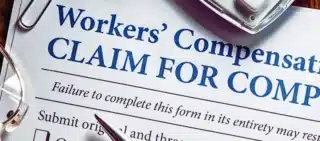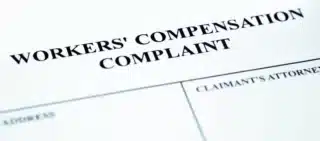
At Strong Law Offices, we have a team of workers' compensation lawyers who understand the financial setbacks and physical limitations...


Illinois law has a time limit for reporting a workplace injury. The best practice is to report your workplace injury as soon as possible, even if it seems minor. You should not be concerned with whether it is a reportable accident. Trying to ignore or downplay the severity of your symptoms may cause problems in the future.

In 2022, private industry employers in Illinois reported 112,500 nonfatal workplace injuries and illnesses. Of these cases, 73,500 were serious and required time off work, job transfer, or restriction, known as DART cases. This resulted in a rate of 1.8 cases per 100 full-time workers. 70% of these DART cases in Illinois led to at least one day off work, slightly higher than the national average of 67%. The remaining 39,000 cases were other recordable cases that did not involve time off work, job transfer, or restriction, occurring at a rate of 0.9. The national rate for other recordable cases was 1.0.
Illinois workers sustain a variety of job-related injuries. Common injuries include:
Slip and fall accidents can occur at any workplace in Illinois. They happen when a person trips, slips, or falls due to various reasons such as potholes, cracks, exposed wiring, wet floors, or food/liquid spills. These accidents can cause severe injuries like broken or dislocated bones, sprains or strains, concussions, back injuries, and other health problems.
It is common in Illinois for workers to carry out the same movements and exertions repeatedly throughout the day. As a result, they may develop repetitive stress injuries that impact their ability to work. While carpal tunnel syndrome is the most widely recognized type of repetitive stress injury, several others can cause long-term complications. These injuries often affect the back, and can be prevented with proper workplace safety implementations.
Illinois has a diverse range of professionals who operate vehicles as a part of their daily job responsibilities. For example, this includes police officers, truck drivers, public transportation drivers, salespeople, and other workers. Vehicle accidents are frequent in Illinois, particularly in densely populated metropolitan areas, and may occur during the course of work duties.
Lacerations are common in construction, manufacturing, and food service industries, and sometimes require significant time off work to heal.
When working with heavy machinery in Illinois, there is a risk of injury from coming into contact with these objects. The severity of the injuries depends on the physical force of the contact. The injuries could range from minor scrapes and bruises to amputated body parts, physical disability, and even death.
Illinois workplaces pose hazards to workers, including exposure to harmful particulates, loud noises, extreme temperatures, and other occupational risks that can result in long-term injuries or illnesses.
Illinois law mandates that workers report a workplace injury within 45 days of the accident. Injuries caused by toxic exposure or repetitive/cumulative use must be reported within 45 days of the worker becoming aware of the injury or condition's ties to the workplace.
Although some companies have policies that require workers to report accidents before the 45 days to receive compensation, this is not a legal requirement. However, it is advisable to report a workers’ compensation injury as soon as possible, even if there are no obvious severe injuries. Soft tissue injuries may take a few days or weeks to manifest or differentiate from minor strains, so it is crucial to document the claim immediately to safeguard your rights.
Under Illinois workers' compensation laws, it is mandatory for you to maintain comprehensive documentation that includes the essential details related to the work-related injury. The records should mention the individuals present during the accident or whom you informed about the incident.
If you are unsure how to report a workplace injury, one of the first steps is to provide a detailed report on the work-related injury or illness that covers the following:
The quality and relevance of evidence is crucial to the strength of your workers’ comp claim. Make sure to gather the necessary documentation. A workers’ compensation lawyer can assist you in compiling relevant evidence, including:
Comprehensive medical documentation is crucial for any workers' compensation claim. This includes detailed accounts of the injury, diagnosis, and proposed treatment plan from your doctor. Such records serve as the foundation of your medical evidence. Your hospital records should also summarize the treatments you received, including surgeries, medications, and any complications. If you have consulted specialists, such as orthopedists or neurologists, their reports can add depth to your medical evidence.
Eyewitnesses provide critical perspectives when investigating an incident. Eyewitnesses include coworkers who were present during the incident and can provide valuable information about how the accident happened. Statements from supervisors can also be useful in shedding light on safety lapses or protocol violations that contributed to the accident. Additionally, if neutral observers were present, their unbiased statements can provide further insight into the incident.
Work-related documents help establish the context and conditions surrounding the incident. They may include an occupational accident report, incident records such as photos or videos, and evidence of breaches in safety protocols. Filing an official accident report immediately after an injury can help note the sequence of events and the immediate actions taken, while incident records can provide further details. Evidence of safety regulation breaches can be crucial in establishing liability.
To claim compensation for medical expenses and lost wages, proper financial documentation is crucial. This includes pay stubs to calculate lost wages, receipts for out-of-pocket expenses, and comprehensive medical bills to validate the need for compensation.
If you miss the deadline for filing your worker's compensation claim, your employer's insurance provider can deny your claim. They may argue that the delay indicates your injury was unrelated to your work or does not qualify for compensation. In some cases, your claim may be denied simply because you did not receive medical treatment within the defined deadlines.
Even if you report within 45 days, not reporting immediately is one of the mistakes that hurt a workers’ comp claim. Some of the most significant problems you may encounter if you wait to report an injury include:
Eligible employees must report work-related injuries or illnesses as soon as possible to start the workers’ compensation claims process. While the 45-day rule is in place to ensure timely reporting, there are some exceptions to this rule.
If the injury or illness takes a couple of months or years to develop due to continued exposure to working conditions or a repetitive motion injury, there may be no obvious date of the injury. However, workers would have 45 days from the date of diagnosis to inform their employers if the injury or illness manifests itself through continued exposure to workplace dangers.
Some medical conditions are exempt from the 45-day deadline. These conditions include pneumoconiosis, radiological exposure, and asbestosis, which can take many months or even years to result in a debilitating illness and yield a diagnosis.
If a worker is suffering from a job-related illness rather than an injury, he or she should report it to his or her employer as soon as possible following the medical diagnosis of the condition. Conditions like mesothelioma may take years or even decades to reveal themselves, so it is essential to report any work-related illness as soon as possible.
To discuss reporting a workplace injury and your options for recovering benefits, contact the Bloomington, Illinois, workers’ comp attorneys at Strong Law Offices.

At Strong Law Offices, we have a team of workers' compensation lawyers who understand the financial setbacks and physical limitations...

Common Equipment Involved in Run-Over Accidents Illinois job sites, from construction zones to industrial plants, depend on machinery to stay...

Why Do Employers Refuse to File Workers' Comp Claims? While most employers understand their legal obligation to report workplace injuries...